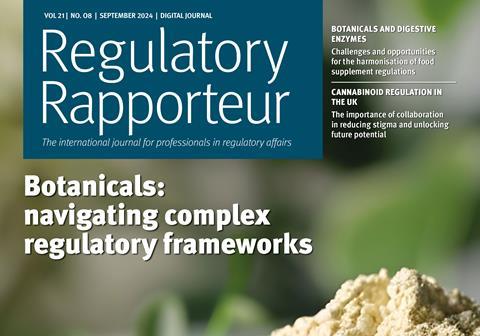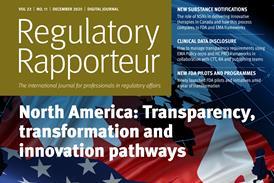
Regulatory
Rapporteur
Write to the Editor at publications@topra.org
September 2024 | Vol. 21 | No.8
EDITORIAL
The complexities of botanical regulation

The September issue of Regulatory Rapporteur focuses on botanicals. Evidence of the therapeutic and healing properties of plants have been documented for centuries and today, we see plant-derived ingredients and compounds in thousands of products across different categories including medicines, food supplements, nutraceuticals and traditional herbal medicines. In this issue, we take a look at the types of products that exist and the regulatory requirements that surround them.
By Sobhey Nassar and Marie Uguen
FOCUS
Botanicals and digestive enzymes demonstrate the complexity and diversity of food supplement regulations in the European Union

A lack of harmonisation in the regulations governing digestive enzymes and botanical ingredients used in food supplements presents challenges in the marketing of these ingredients in the European Union. This article details the rules applicable to these ingredients according to the EU Novel Food Regulation (Regulation (EU) 2015/2283) and national lists regulating “other substances” used in food supplements, and illustrates how these rules create barriers and uncertainty for food business operators.
By Ainhoa Larrañaga Guetaria and Nikolaas Tilkin-Franssens
FOCUS
Introduction to cannabinoids: understanding UK regulation, structure, industry dynamics and charting the future

Cannabinoids are a complex and rapidly evolving area of study with significant potential for medical and therapeutic applications, but they are also subject to strict regulatory scrutiny due to their varied effects and legal status. This article discusses the structure, UK regulation and industry dynamics surrounding cannabinoids, and the challenges and opportunities faced by the industry regarding demand, supply and distribution.
By Greer Deal and Tracey Goldsworthy
STANDALONE
Borderline products and self-care in the digital age

As software increasingly plays a role in self-care, from wellness monitoring to diagnostic tools, distinguishing these applications from general health apps and those qualifying as medical devices is increasingly critical. Borderline products, which straddle multiple regulatory categories, pose significant challenges to the UK’s digital healthcare landscape. This article discusses the complexities of classifying these products, particularly Software as a Medical Device (SaMD).
By Christina Gkouva and Cameron Rait
STANDALONE
What are the future prospects for antimicrobial agents?

The WHO has declared that antimicrobial resistance (AMR) is one of the biggest threats to world health, and there is a global focus on addressing this critical issue, both through preventative measures to mitigate the risk of development of resistant strains and by improving the availability and accessibility of new antimicrobial agents. This article looks at current and future prospects for the regulation of these agents and how to boost research, development and innovation in AMR in human and animal health.
By Sacha Lynch, Kate Milsted and Suman Jhand
STANDALONE
Navigating drug registration in China: accelerated review policies and pathways

As part of its commitment to reform its drug registration system to simplify application procedures and align them with international standards, China has introduced accelerated review policies and pathways for the registration of drugs for urgent clinical use, rare diseases and breakthrough therapies. As part of a series, this article provides an overview of the standard drug registration process in China and offers a detailed analysis of these accelerated pathways, outlining the requirements, benefits, timelines and advice for those navigating these policies for faster market access.
By April Wang
STANDALONE
Sustainability and personal care: a regulatory view

The personal care industry is undergoing a rapid shift towards sustainability, driven by consumer demand, corporate responsibility and regulatory imperatives. This article explores the regulatory frameworks influencing sustainability practice in the personal care industry, including the forthcoming EU Green Claims Directive, certification programmes to regulate organic ingredient sourcing and manufacturing, and current initiatives by industry associations.
By Vinetta Brew and Dr Henry Brew


























No comments yet